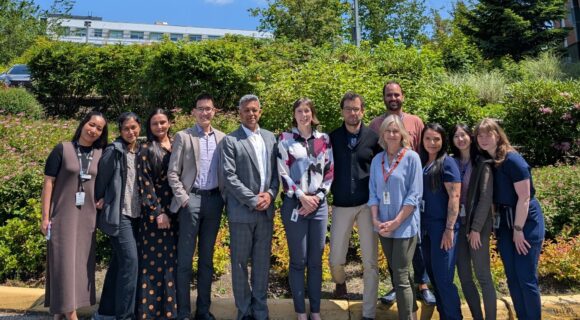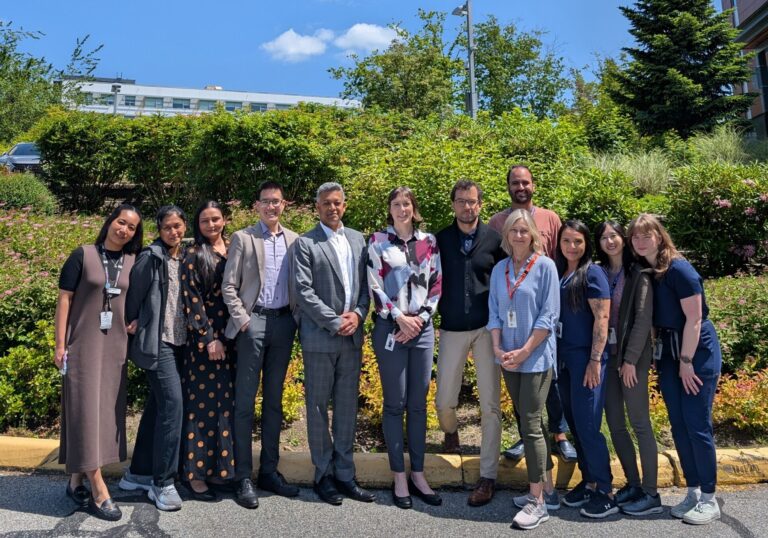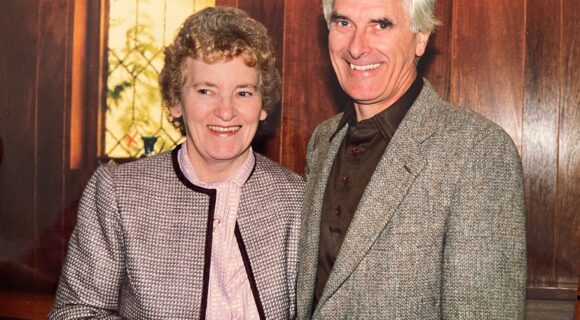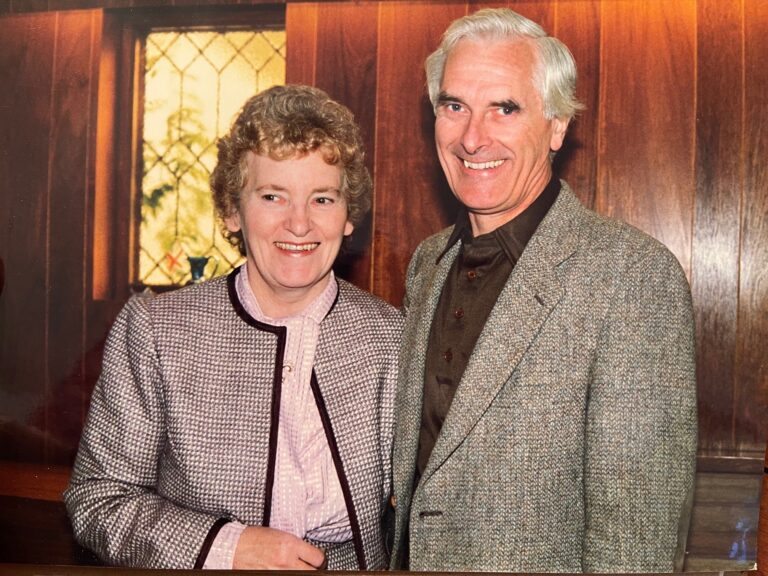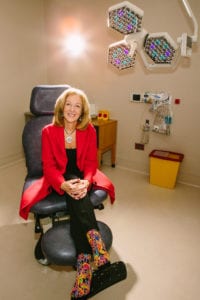
On December 1, 2020, the Canada’s Most Powerful Women: Top 100 Award Winners list was released by Women’s Executive Network and Presenting Partner KPMG in Canada. We are delighted to share that Surrey Hospitals Foundation’s President & CEO, Jane Adams, has won one of Canada’s Most Powerful CEOs Awards, presented by KPMG.
Jane’s fulsome career and dedication to community is brilliantly captured in the article below.
Congratulations, Jane!
Media Stories:
Article by:
MARY TERESA BITTI
Postmedia Content Works
Growing up in a working-class neighbourhood in Halifax, the youngest of three children, Jane Adams says she lived in a bit of a bubble. Everyone came from similar backgrounds and families stayed for generations. It’s where she learned to be resourceful, to figure things out and get on with it — all attributes the many strong women in her life modelled.
Her paternal grandmother, who had survived the 1917 Halifax Explosion, was widowed at 19 with two young children when her husband was killed by a New York inter-urban train. She went on to win one of the earliest survivorship settlements awarded to a woman. It allowed her to raise her children independently.
Adams’ own mother was an orphan who entered university at 16 and was one of the first three women to be accepted and graduate after the Second World War. “One of my favourite memories of her steely determination was when her first new car encountered a flaw,” says Adams. “Her attempts at restitution were unsuccessful so she bought a typewriter and persisted in reaching out directly to the CEO of the car company in Detroit. She prevailed. They gave her a new car.”
Adams has carried these lessons and examples of resilience throughout her career in the non-profit sector and employs them today as President and CEO of the Surrey Hospitals Foundation. They have also made her an honouree in the Canada’s Most Powerful CEOs category in the 2020 Canada’s Most Powerful Women: Top 100 Awards.
Surrey, B.C. in 2020 is a far cry from the Halifax of Adams’ youth. A young, fast-growing city of 680,000, each month 1,200 people from all over the world make Surrey home. The city receives more than a quarter of all refugees settling in British Columbia, more than any other municipality in the province. The speed of the city’s growth and the diversity and youth of its citizens — one in three people are under the age of 19 — create a unique set of challenges for its hospitals, which rely on Surrey Hospitals Foundation for funding.
A registered charity, the foundation is the largest non-government funder of health care in Surrey. Taking on urgent challenges, where action is critical and where there is an opportunity to make real longstanding societal impact, are hallmarks of Adams’ distinguished career in the non-profit sector. The ability to make a difference is what drew her to Surrey Hospitals Foundation, foregoing an opportunity to head a much larger organization. At that point, she had already implemented a successful turnaround of St. Paul’s Hospital Foundation, which supports St. Paul’s Hospital, an acute care, teaching and research hospital located in downtown Vancouver. She restructured and diversified the revenue base and built closer relations with other foundations, and created bridges to academic initiatives with local universities.
“For me, being able to see in very concrete ways how you’re advancing the mission of the organization is very important. I experience that more in smaller organizations that are building,” says Adams. “The types of organizations I’ve worked in tend to be more roll-up-your-sleeves, therefore less hierarchical and with more opportunity for entrepreneurship.”
That’s certainly true of her experience at Surrey Hospitals Foundation. When she took the helm in 2007, the foundation was running an operational deficit as it transitioned from dependence on lottery revenue to donations. Under Adams’ leadership, the foundation has outperformed other local agencies in fundraising and significantly expanded its scope, from supporting one hospital, Surrey Memorial Hospital (SMH), to multiple health care facilities, including the Czorny Alzheimer Centre, which it owns.
Her foundation collaborated with Fraser Health Authority and the provincial government on some of B.C.’s most innovative health-care infrastructure expansions. These include the Critical Care Tower at SMH; the Jim Pattison Outpatient Care and Surgery Centre (Adams and her team raised more than $10 million in just over three months for this initiative); the construction of B.C.’s largest stabilization unit for children and youth with mental illness; Surrey’s first pediatric ER; the creation of Timber Creek, a tertiary mental health facility for adults; and B.C.’s first mental health and addictions urgent response centre.
Recently, Surrey Hospitals Foundation collaborated with the Ronald McDonald House Charity to help the latter fund family rooms in SMH’s critical care tower. “We understood Ronald McDonald House’s services embedded in our hospital were important for our patient families. I was surprised to learn that despite their presence across Canada, we are the only hospital foundation they have this type of arrangement with.”
She extends that collaborative spirit beyond health care to local charities that often get overlooked by donors. Adams recruited two competitive charities and launched a municipal campaign entitled Give Where You Live, to encourage more people to give locally. “I’m a Maritimer, (so I know) rising tides raise all boats. If people have access to services that might help prevent them from becoming severely ill, quality of life will improve. It’s important for all of us to work together.”
Adams’ leadership is defined by her ability to sense and seize opportunity and to get the best out of people by building inclusive, diverse, high-performing teams. When it comes to hiring, she looks for the right person in terms of shared values and fit, as opposed to skills, and then builds job descriptions around the individual. She has implemented hiring and interview processes to attract diverse talent. “Inclusion and diversity don’t happen by accident,” says Adams. “We need to be able to relate to the people who give us their discretionary income and who use the health care system’s services. To do that, we need those voices at the table and a culture where people feel safe to contribute, to share their unique experiences and to be themselves. It’s important to not just see diversity but to feel it.”
As former chair of the Surrey Board of Trade Industry Committee, she partnered with the private sector, academia and government to be a catalyst for innovation in health care.
Her efforts have earned the foundation recognition as non-profit of the year by the Surrey Board of Trade and as the city’s favourite charity in a Black Press poll. Adams was personally recognized for her achievements with an honourary degree from Kwantlen Polytechnic University.
When she became inaugural executive director of B.C. Women’s Hospital Foundation in 1995, a women’s hospital was a new concept in B.C. Adams educated herself on women’s health,and developed a network of advocates to socialize the idea, which then enabled her to raise funds to support women’s health programs and research. She did this while merging two disparate cultures, as B.C. Women’s Hospital was the amalgam of a veterans hospital and a maternity hospital.
Adams got her start in the non-profit sector as a recent public relations graduate at Sport Nova Scotia, an umbrella organization for non-profit sporting groups. Fresh out of school and full of ideas, she wanted to launch a publication. “There was no money, so I had to raise the revenue. My boss said, ‘go make it happen.’” This turned out to be a pivotal moment in her career. “That’s when I realized I liked the sector, the sense of purpose, the immediacy of starting and finishing something, but also having a concrete goal.”
A role managing capital campaigns for the University of Toronto had her working simultaneously with the faculties of medicine and engineering— an experience that solidified her career in the sector. “You can gain exposure to high-quality leaders and thinkers when you are quite junior and you can move a project from an idea to fulfillment,” says Adams. It’s a message she shares with young people coming into the sector, particularly women.
It was during her time at Ketchum, a leading national fundraising firm, that Adams received a piece of advice that would shape her leadership. She was in a meeting with a well established, highly respected client and he asked for her opinion. “I was tentative and hesitated. He leaned in and said, ‘You know, Jane, 50 per cent of decisions any leader makes are right and 50 per cent are wrong. If you are reluctant and only make two decisions, one will be wrong and that’s what people will remember you for. But if you make 100 decisions, 50 will be right and that’s what people will remember.’ It unleashed my natural tendency to act.”
This is exactly what she did when COVID-19 hit B.C. The foundation could have shut its doors. Instead, Adams did what she always does: assessed the situation and seized the opportunity to make things better.
“All the services around the hospital had shut down and there was a whole audience of people who wanted to help,” she says. So the foundation worked with local restaurants to create a food program that delivered 144,000 meals to frontline staff. “There are always ways to help if you stay rooted in your purpose and focus on what you can do to be part of the solution.”
